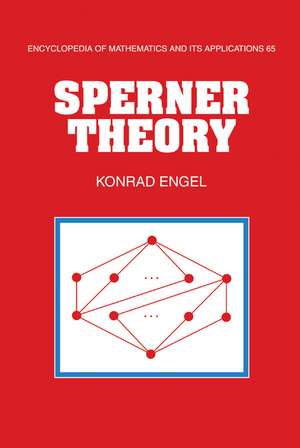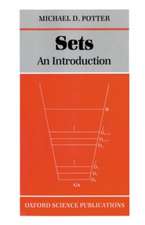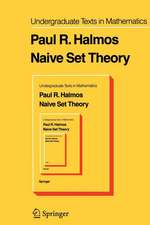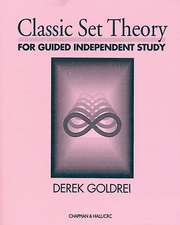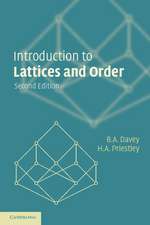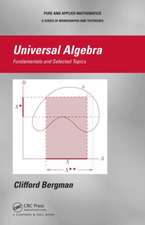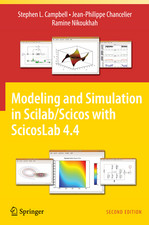Sperner Theory: Encyclopedia of Mathematics and its Applications, cartea 65
Autor Konrad Engelen Limba Engleză Hardback – 27 ian 1997
Din seria Encyclopedia of Mathematics and its Applications
- 14%
 Preț: 1549.84 lei
Preț: 1549.84 lei - 14%
 Preț: 824.26 lei
Preț: 824.26 lei -
 Preț: 304.51 lei
Preț: 304.51 lei - 23%
 Preț: 1152.05 lei
Preț: 1152.05 lei - 14%
 Preț: 820.08 lei
Preț: 820.08 lei -
 Preț: 545.43 lei
Preț: 545.43 lei - 23%
 Preț: 888.01 lei
Preț: 888.01 lei - 14%
 Preț: 913.92 lei
Preț: 913.92 lei - 8%
 Preț: 391.04 lei
Preț: 391.04 lei - 9%
 Preț: 1191.73 lei
Preț: 1191.73 lei - 14%
 Preț: 1148.32 lei
Preț: 1148.32 lei - 14%
 Preț: 1150.00 lei
Preț: 1150.00 lei - 14%
 Preț: 1113.11 lei
Preț: 1113.11 lei - 23%
 Preț: 698.90 lei
Preț: 698.90 lei - 11%
 Preț: 477.60 lei
Preț: 477.60 lei - 14%
 Preț: 1266.62 lei
Preț: 1266.62 lei - 14%
 Preț: 1022.88 lei
Preț: 1022.88 lei - 23%
 Preț: 809.74 lei
Preț: 809.74 lei - 14%
 Preț: 1414.63 lei
Preț: 1414.63 lei - 14%
 Preț: 1148.32 lei
Preț: 1148.32 lei - 14%
 Preț: 893.53 lei
Preț: 893.53 lei - 14%
 Preț: 896.52 lei
Preț: 896.52 lei - 14%
 Preț: 1144.20 lei
Preț: 1144.20 lei - 14%
 Preț: 1008.51 lei
Preț: 1008.51 lei - 11%
 Preț: 586.99 lei
Preț: 586.99 lei - 14%
 Preț: 1146.36 lei
Preț: 1146.36 lei - 14%
 Preț: 796.43 lei
Preț: 796.43 lei - 14%
 Preț: 897.17 lei
Preț: 897.17 lei - 14%
 Preț: 933.75 lei
Preț: 933.75 lei - 11%
 Preț: 576.03 lei
Preț: 576.03 lei - 14%
 Preț: 1007.34 lei
Preț: 1007.34 lei - 14%
 Preț: 1145.84 lei
Preț: 1145.84 lei - 14%
 Preț: 1005.39 lei
Preț: 1005.39 lei - 14%
 Preț: 1241.27 lei
Preț: 1241.27 lei - 14%
 Preț: 792.77 lei
Preț: 792.77 lei - 11%
 Preț: 516.67 lei
Preț: 516.67 lei - 14%
 Preț: 792.96 lei
Preț: 792.96 lei - 14%
 Preț: 1347.21 lei
Preț: 1347.21 lei - 14%
 Preț: 1006.04 lei
Preț: 1006.04 lei - 20%
 Preț: 330.55 lei
Preț: 330.55 lei - 14%
 Preț: 1034.60 lei
Preț: 1034.60 lei - 14%
 Preț: 1235.87 lei
Preț: 1235.87 lei - 14%
 Preț: 892.36 lei
Preț: 892.36 lei - 20%
 Preț: 884.04 lei
Preț: 884.04 lei - 23%
 Preț: 912.22 lei
Preț: 912.22 lei - 14%
 Preț: 894.03 lei
Preț: 894.03 lei
Preț: 895.87 lei
Preț vechi: 1041.71 lei
-14% Nou
Puncte Express: 1344
Preț estimativ în valută:
171.45€ • 177.48$ • 144.91£
171.45€ • 177.48$ • 144.91£
Carte tipărită la comandă
Livrare economică 06-20 martie
Preluare comenzi: 021 569.72.76
Specificații
ISBN-13: 9780521452069
ISBN-10: 0521452066
Pagini: 432
Ilustrații: 25 b/w illus. 1 table
Dimensiuni: 163 x 243 x 31 mm
Greutate: 0.78 kg
Editura: Cambridge University Press
Colecția Cambridge University Press
Seria Encyclopedia of Mathematics and its Applications
Locul publicării:New York, United States
ISBN-10: 0521452066
Pagini: 432
Ilustrații: 25 b/w illus. 1 table
Dimensiuni: 163 x 243 x 31 mm
Greutate: 0.78 kg
Editura: Cambridge University Press
Colecția Cambridge University Press
Seria Encyclopedia of Mathematics and its Applications
Locul publicării:New York, United States
Cuprins
1. Introduction; 2. Extremal problems for finite sets; 3. Profile-polytopes; 4. The flow-theoretic approach; 5. Symmetric chain orders; 6. Algebraic methods in Sperner theory; 7. Limit theorems; 8. Macaulay posets.
Recenzii
'The presentation is very good and the book should be understandable for a non-specialist.' European Mathematical Society
Descriere
Emphasises the powerful methods arising from the fusion of combinatorial techniques with programming, linear algebra, and probability theory.
